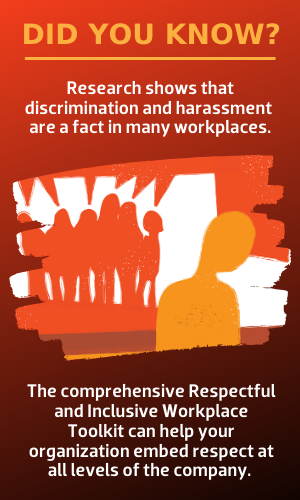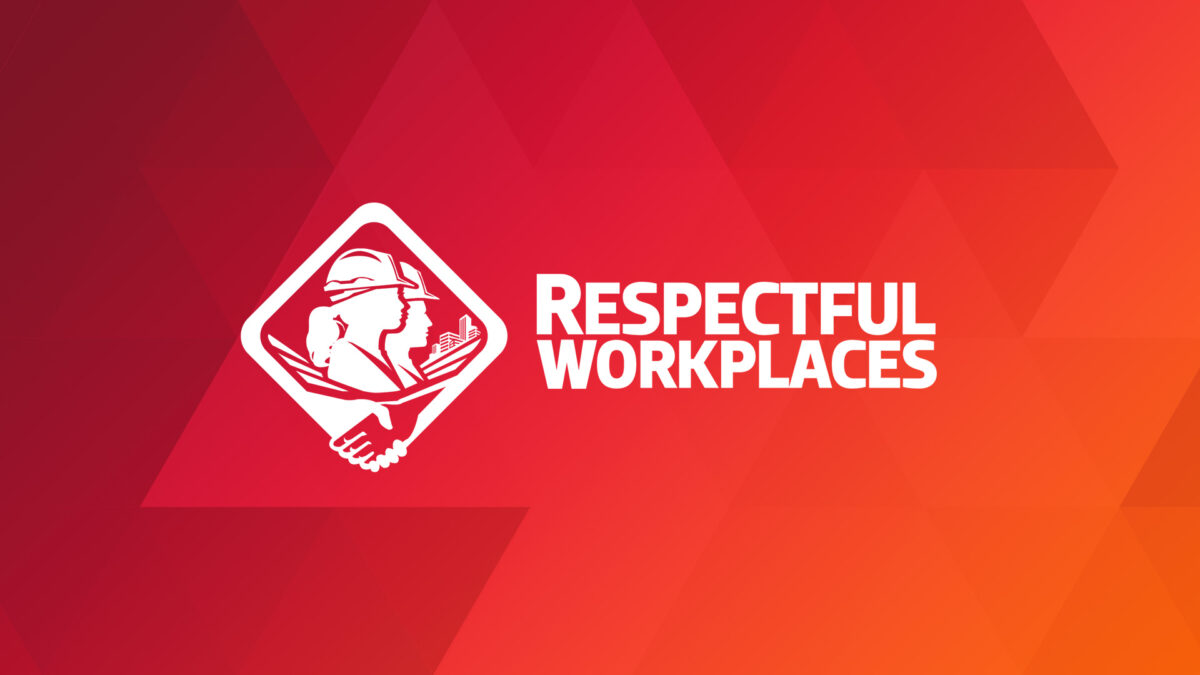Does your organization have a culture of respect to help prevent violations of respect?

Readers may remember from Blog #38 that we discussed the importance of respect as a core value in creating and sustaining a respectful and inclusive workplace.
Recently there have been many high-profile cases of discrimination and harassment in organizations that claim to be respectful workplaces. For example, McDonald’s dismissed its Chief Executive Officer in November 2019 amidst allegations of discrimination and harassment at the company. In another example, shareholders of the parent company of Google sued several company officers and directors in January 2020 alleging “active and direct participation in a multi-year scheme to cover up sexual harassment and discrimination” despite the fact that Google spends millions of dollars a year on respectful and inclusive initiatives.
Less visible are the statistics showing that violations of respect are a fact in the workplace. For example, Statistics Canada reports that 19% of women and 13% of men reported that they had experienced harassment in their workplaces in 2018. Women were more likely to report sexual harassment in their workplace (4%) than men (less than 1%).
Clearly the message isn’t getting through.
What can organizations do to ensure that respect is a way of life?
1. Clearly define respect as a core value and what that means.
In order for an organization to be respectful, respect must be a core value, and as such provides the foundation for determining how a policy or program should be developed and implemented.
The core value must be clearly stated and provide the framework for every other policy and program, including policies on discrimination and harassment. Research shows that for a policy to be effective it must be clearly tied to an organization’s core values. People are more motivated to support a policy when they understand the purpose behind it.
2. Ensure that every person including officers, managers, and supervisors, knows that in addition to supporting organizational core values, they are responsible by law for preventing and addressing violations of respect.
Under human rights laws, organizations cannot claim ignorance of violations of respect. Organizations are expected to provide workplaces free of discrimination and harassment, and prevent violations of respect from occurring in the first place.
3. Leaders must be unified and visible in their commitment to respect: they must “walk the talk.”
In a respectful and inclusive workplace, employers take into consideration the rights and feelings of their workers. This includes understanding that discrimination and sexual harassment create poisoned workplaces that cause anxiety, fear, and disengagement.
4. The organization’s training strategy must use multiple channels and methods to ensure that every person knows how to implement principles of respect into their daily lives.
This would include regular training on recognizing discrimination and sexual harassment, the responsibilities of senior staff and workers, and how to prevent and address situations when they occur.
The BuildForce Respectful and Inclusive Workplace Toolkit provides a comprehensive toolkit for organizations that want to embed respect at all levels of the company. Organizations might consider using the “Working in a Respectful and Inclusive Workplace” online course to train any level of manager and worker in the foundations of a respectful and inclusive workplace. It provides information about the effects of violations of respect in a workplace, how they can be prevented, individual responsibilities, and how to address situations when they occur.
For more info:
- Chaffin, Joshua and Leila Abboud. “Navigating the New Rules.” The Financial Times of London. 9 November/10 November.
- Needleman, Sarah E., Rob Copeland. “Alphabet’s Legal Chief to Leave”. The Wall Street Journal. Saturday/Sunday, January 11-12, 2020.
- Statistics Canada. Insights on Canadian Society. “Harassment in Canadian workplaces.” Accessed on February 11, 2020: www150.statcan.gc.ca/n1/pub/75-006-x/2018001/article/54982-eng.htm.
Read from the beginning. Click here to start at Part 1.
What can an effective Respectful and Inclusive Workplace Program deliver?
- Become an employer of choice – attract, retain, and advance top talent from all sources of labour
- Unlock collaboration and innovation – create high-performing teams through diversity of thought and experience
- Build your brand – your organization will gain a competitive edge as a leader and innovator
Get started today!
The BuildForce Canada Online Respectful and Inclusive Workplace Toolkit includes:
- the Respectful Workplace Online Self-Assessment Tool to assist organization leadership in assessing their current situation and identifying where they may need to make changes
- the Respectful Workplace Policy Framework and Implementation Guide to assist organizations in creating and implementing a policy that supports a respectful and inclusive workplace
- the Respectful Workplace Online Training Course to train workers on how to create and support a respectful and inclusive workplace
- the online course Introduction to Understanding Systemic Racism: A Guide for Leaders and Managers
All the resources you need to create and support a respectful and inclusive workplace!

Respectful and Inclusive Workplaces
